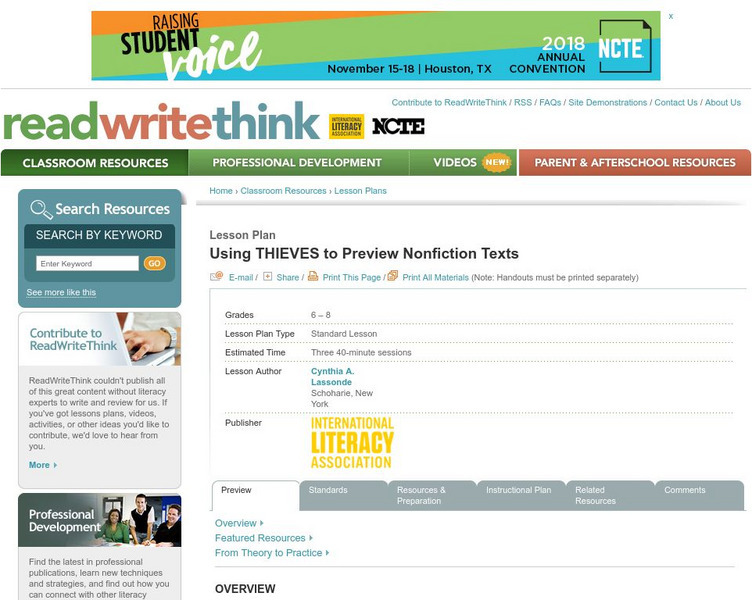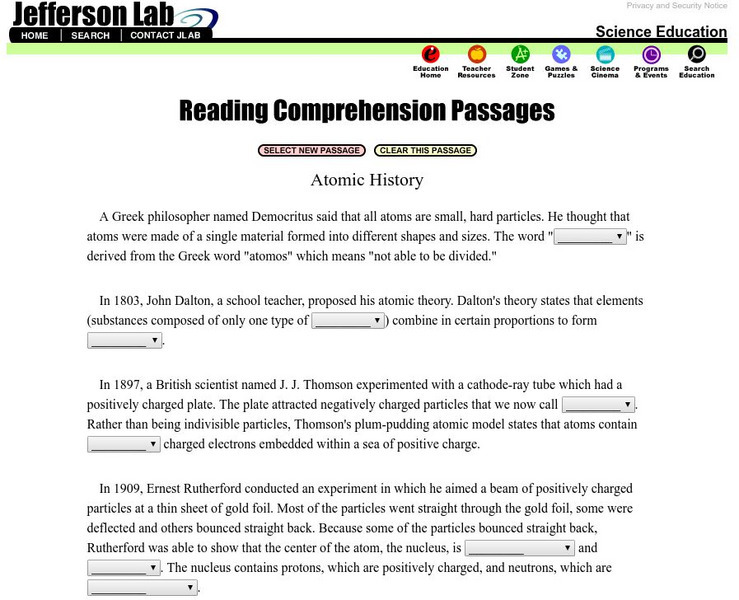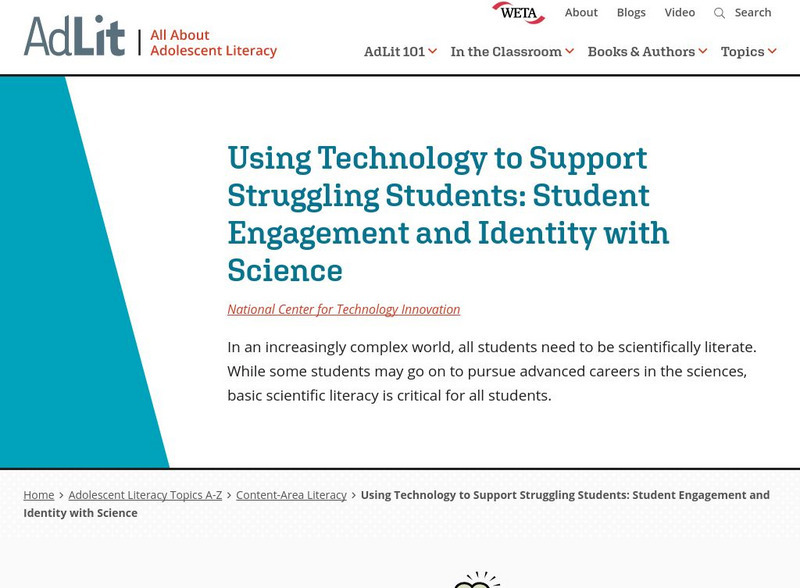Hi, what do you want to do?
Curated OER
Surveying New Territory
Pupils explore recent research linking economic status with student behavior. They design their own studies that investigate how different variables are related to student performance in particular subject areas.
Curated OER
What is a Cloud?
Third graders identify a cloud and explore how they form. They create an acrostic poem about clouds.
Curated OER
Recognizing Peace
Students read the statement of Alfred Nobel and discuss the Nobel Peace Price and its criteria. They consider criteria and selection process to establish a school or community peace award. Students consider potential recipients for the...
Curated OER
Anatomical Female Reproductive System
Students dissect internal female reproductive organs and take digital pictures that are exported onto a disc for use with power point technology.
Curated OER
Introducing Biographies-Getting to Know You
Students study biographies as a nonfiction genre while examining a variety of examples. Next, they access and complete an online tutorial about biographies. They choose one person that interests them to conduct further research using a...
Curated OER
Economics Lesson Plan #2
Students work together to define key terms related to Economics. They rotate between posters as they discover new terms. They discuss how economies function.
Curated OER
Career Exploration Using HyperStudio
Eighth graders conduct research on various careers that are of interest to them. They conduct Internet research on a selected career choice, and create a nine card stack using HyperStudio to describe their career's salary, required...
Curated OER
Back to School with Paper Quilts and Partnerships
Make a commitment to collaboration, and build classroom community by integrating art and classroom objectives to create a paper quilt.
Curated OER
Personalized Postcards
Learners create and send postcards to friends and family members. Using actual photographs, they write a rough draft and final draft of a paragraph and print it out to glue onto a postcard template to mail to their friend or family member.
CPALMS
Cpalms: Graphic Organizers for Science Reading/writing
This resource provides multiple graphic organizers for reading and writing in the science content area. [Registration is required.]
Reading Rockets
Reading Rockets: Content Area Literacy
Content area lessons require specific techniques and knowledge that help students navigate different types of texts. Here you will find articles, videos, teaching strategies, webcasts, and research reports.
ReadWriteThink
Read Write Think: Using Thieves to Preview Nonfiction Texts
Contains plans for three lessons that introduce a nonfiction prereading strategy with the acronym THIEVES, which stands for Title, Headings, Introduction, Every first sentence, Visuals and vocabulary, End Questions, and Summary. In...
University of South Florida
Fcat Express: Fcat Practice Reading Tests
Provides nine interactive, online practice tests for the fourth grade Florida Comprehensive Assessment Test (FCAT). Each test uses a number of reading skills and uses both multiple choice questions and short written responses. It...
PBS
Pbs Learning Media: Walmart Middle School Litercy Initiative
Interactive, student-paced lessons on such literacy skills as categorizing, comparing and contrasting, summarizing, evaluating, determining cause and effect, using text features, connecting, inferring, sequencing, understanding problems...
AdLit
Ad lit.org: Content Area Literacy: Science
The demands of comprehending scientific text are discipline specific and are best learned by supporting students in learning how to read a wide range of scientific genres. Besides text structures emphasizing cause and effect, sequencing...
Thomas Jefferson National Accelerator Facility
Jefferson Lab: Reading Comprehension Passages
Read and fill in the blanks of science passages which range from easy to very hard. Each blank has a dropdown menu with choices. When you finish, click CHECK MY ANSWERS. If you pick a wrong answer, the right answer will be displayed...
Thomas Jefferson National Accelerator Facility
Jefferson Lab: Reading Passages: Atomic History
Read and fill in the blanks of this passage explaining atomic history. Each blank has a dropdown menu with choices. When you finish, click CHECK MY ANSWERS. If you pick a wrong answer, the right answer will be displayed along with your...
Other
Super Teacher Worksheets: Reading Comprehension: Hurricanes [Pdf]
Read the fifth-grade reading passages and charts about hurricanes by Erin Ryan and answer the comprehension questions over the selections. PDF includes an answer key with explanations.
Utah Education Network
Uen: The Good, the Bad, and the Both
After exposures to assorted forms of informational text and media, Istudents will identify positive and negative effects of microorganisms. Students will explore how some micooorganisms have overcome their negative attributes while...
University of California
Regents of the University of California: Using the Cognates Strategy
This strategy guide introduces an approach for making students aware of cognates (words that have a similar spelling, pronunciation, and meaning across languages) in content-area texts. This guide includes an introductory section about...
AdLit
Ad lit.org: Using Technology to Support Struggling Students
In an increasingly complex world, all students need to be scientifically literate. While some students may go on to pursue advanced careers in the sciences, basic scientific literacy is critical for all students.
Polk Brothers Foundation Center for Urban Education at DePaul University
De Paul University: Center for Urban Education: I Can Classify and Infer When I Read [Pdf]
This site contains links to two graphic organizers to guide and assess the understanding of nonfiction text in science and social studies.
Reading Rockets
Reading Rockets: Reading Topics a to Z: Scientific Language in Primary Grades
Research on the importance of teaching scientific language usage, ideas for utilizing scientific language, and rubrics for assessing student use of scientific language in grade schools.
Polk Brothers Foundation Center for Urban Education at DePaul University
Depaul University: Center for Urban Education: Classify Facts and Opinions [Pdf]
Students will find three lessons about facts and opinions in this learning module. The following topics are linked in the module: contrast and evaluate fact and opinion; classify facts and opinions; and locate and classify facts.






















![De Paul University: Center for Urban Education: I Can Classify and Infer When I Read [Pdf] Unit Plan De Paul University: Center for Urban Education: I Can Classify and Infer When I Read [Pdf] Unit Plan](https://content.lessonplanet.com/knovation/original/119984-1e8c3bd778b0e773bd6dcdc545a348e7.jpg?1661787061)

![Depaul University: Center for Urban Education: Classify Facts and Opinions [Pdf] Unit Plan Depaul University: Center for Urban Education: Classify Facts and Opinions [Pdf] Unit Plan](https://content.lessonplanet.com/knovation/original/119988-719af6c927af61affa025c27754c7fae.jpg?1661787067)